With biting, a cat is trying to convey certain information to its owner. She may be bothered by too much attention, annoying smells, and other details. Cats have no other way to show their displeasure, so they use their teeth to communicate with humans. Another way is by marking different parts of the house.

- Why does a cat bite and what should the owner do about it?
- A cat bites when you pet it
- Why a kitten bites
- How to wean a cat from biting
- Love bites: is it aggression?
- Why does my cat bite me for love?
- Causes of unexpected aggression
- Aggression
- Pain
- Static electricity
- The gender of the pet
- Cat behavior patterns
- Playing .
- Master – food
- Licking the owner's hand is a bite
- Resentment .
- Why the cat bites
- Problems with socialization
- Disease
- Playing
- Manifestation of love
- How to Teach a Cat to Bite
- Reasons why cats may bite when you pet them
- What to do if kittens bite, how to educate them
- How to wean a cat from biting and scratching
- How to protect yourself from scratches
- Is scratching always aggression?
- Why adult cats scratch
- Inability to clean claws
- Playful fuse
- Aggression
- Why a cat is petted first and then may bite
- Tired of being petted, wants to stop
- Doesn't want human contact
- Petting in an unpleasant place
- How to react to biting while stroking
- How to keep your cat from biting
- Kitten
- An adult.
- Important rules
Why does a cat bite and what should the owner do about it?
Cats are beloved pets for many, affectionate and fluffy. But some of them, even the kindest, can bite in different situations. This way of showing aggression is normal for your little predator. The main thing is to understand why the animal does it. We understand why a cat bites and how to be an owner who suffers from the sharp teeth of his favorite fluffy.
Situations in which the cat bites, quite a few. She can sink her teeth into your hands, feet and other parts of the body for a variety of reasons. This is how an animal's instinct to defend itself or attack, to hunt.
Try to understand what exactly caused the biting in this or that situation. How was the cat behaving before it started biting you? What was new around her? How was it feeling? When you understand the cause, you can eliminate the consequence and prevent cat bites in the future. Let's break down the most common situations in which a cat may bite.
A cat bites when you pet it
This is how the pet is trying to convey that petting is inappropriate right now. Why? The reason is always individual. Maybe this particular cat doesn't like petting in a particular part of the body, such as the tail area. In this case, it is better to switch to the muzzle and see how the purr responds. Many cats do not like having their belly scratched.
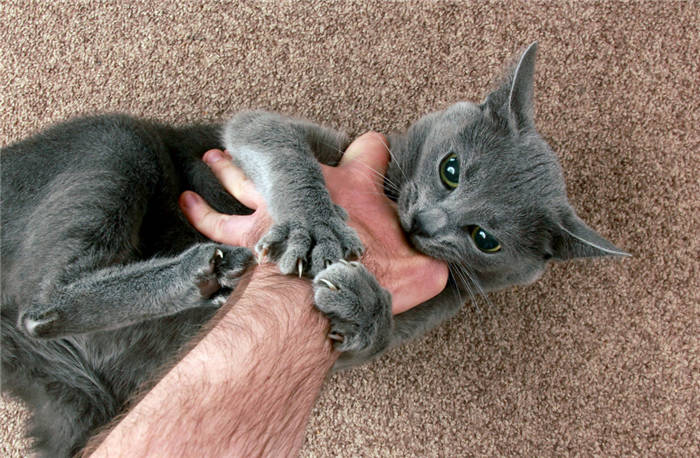
Another reason why a cat bites the hand that is stroking it is pain. Perhaps there is a wound somewhere under the thick fur, so stroking causes an unpleasant sensation. In any case, a bite is a sign for humans to stop.
Why a kitten bites
Small domestic predators do not yet know how to regulate their feelings. Of course, the cat's psyche does not work the same way as in humans, and yet there are some similarities. They often have something that arouses strong emotions – a game, the owner's pet, other animals. And the kitten finds a way to overcome the stress – it bites. In such cases, you need to stop unwanted behavior: a stern voice to prohibit bullying, stop the game or stop petting.
How to wean a cat from biting
First of all, you need to understand in what situations the cat bites. If the pet has always been affectionate and kind, but suddenly started grabbing the owner's hands and feet, perhaps he is stressed or sick. The trigger could be a move, a new family member, your long absence and other factors.
Stress has been ruled out? Then show your pet to the veterinarian. The doctor will examine the cat, and if necessary, carry out further tests. An experienced veterinarian will recognize the pet's latent pain. Some owners notice that the cat has stopped biting and has become kinder after neutering.
When stress and illnesses you have noted, then it's about behavior and character. The good news is that a cat's behavior is correctable. What to do?
- Socialize your kitty. Introduce him to other people and animals. The cat should have no fear of strangers. Don't limit the cat's safe movement around the house, let it explore its territory well.
- Stop play when the cat starts biting. Freeze, don't make a "mean hand," and ignore the attacks. In a stern voice, say, "No. You can't."
- Don't allow biting during playtime. Use fishing rods, toys, and teasers to do this. For your pet to expend its energy in a beneficial way, equip a complex on which you can be active.
- Never yell or swear. Your emotional reaction will only reinforce unwanted behavior.
- Respect the pet's personal space. If the cat bites you when you pet it long or wrong, just stop. The pet is signaling that petting is enough for now, and you should stop.
The most important thing to understand is that cats don't bite because they are mean animals. Every pet's behavior has a reason. Be attentive, caring and patient.
Just for the readers of our blog, we are happy to offer a 30% discount on a starter kit for cats and dogs, don't miss your chance to take advantage of this great offer!
Love bites: is it aggression?
Love bites are not the same as aggression, which comes from fear, defensiveness or dominance. Aggression can hurt and tear the skin, while love bites are gentle and usually occur along with licking and grooming.
If your cat bites you gently and remains calm, it is probably a love bite. If your cat growls, hisses and scratches while biting you, it is an aggressive bite that is a reaction to fear or other negative emotions.
Why does my cat bite me for love?
Although we call it "love bites," the name is not quite accurate. When cats give you love bites, it's a signal that they don't want to be continued stroking or playing with them. If you keep stroking the cat, the bites may become stronger or more frequent, or the cat may go away altogether.
Another possibility is that loving bites are part of the cat's grooming behavior. Cats use their teeth while grooming, so if your cat is licking you and suddenly bites you, it may just be unintentional.
Finally, a cat may like your attention and affection, but may not want you to pet a certain spot. Many cats don't like to be stroked on their belly or near their tail, habitual places for dog owners to pet them. Also, the cat may just want to relax in your lap and enjoy your company without being petted.
Causes of unexpected aggression
Cats can bite in many different ways. There are two variations of this behavior:
- The rarest is that the pet gently bites their fingers, with their claws retracted and their actions more likely to be pleasant than not. This is what they do most often when communicating with their offspring. When a cat behaves this way with its owner, it means it trusts him and loves him very much.
- More common is an abrupt change in behavior. A second ago the cat was taking petting absolutely calmly, showing no signs of aggression, and now it has turned over and started biting and scratching its hand painfully.
It is important to understand the reasons that prompt cats to bite and scratch their owner's hands. Some of the most common include.
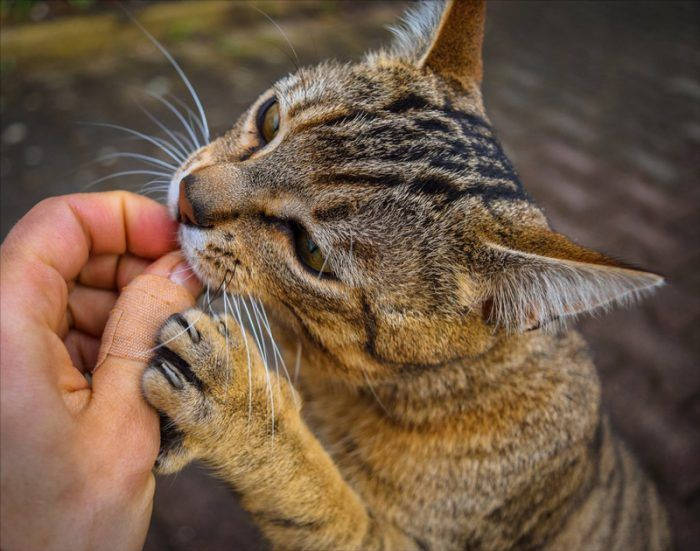
Aggression
Often a sign of problems with the pet's socialization. Breeders try to accustom the kitten to petting as early as 7 weeks of age. If this is not done, then as an adult, such an animal will dislike affection from the owners and bite.
Pain
It is important to remember that cats, like people, are not always healthy, they have abdominal pain, back, head, joints, there may be skin problems. So when showing affection, when they don't feel well, they may bite. This is their way of telling their owner to leave them alone.
If this behavior appears, which is not typical, it is worth going to the veterinarian for an examination, as it may be an indirect sign of illness.
Static electricity
Often when the pet's fur is too dry and the air is too humid, micro-discharges may occur when stroking the pet. A person may not notice this, but the pet is extremely uncomfortable, so it may bite.
The gender of the pet
This factor also needs to be taken into account. Many cats are more affectionate, but can be aggressive after becoming a mother. Cats, often independent and do not like excessive affection, the exception is neutered individuals, they begin to show more attention to the owner and demand the same from him.
Cat behavior patterns
Experts have identified several patterns of behavior of cats when they can bite people:
Playing .
This is always aggression, but like learning or training. The object is a model (a rubber ball, an artificial mouse, a rattle on a string, etc.). For kittens, this is training, learning to hunt, which is inevitably accompanied by biting. Therefore, you should not play with your hands or feet with the pets, as they begin to be perceived as a "victim", which must be caught and disarmed. When playing with toddlers, this behavior is amusing at first, but it will fix this model of play and it will be difficult to wean them from it in an older age.
Entertaining pets should be done only with the help of special devices for cats.
Master – food
People are a source of food for their pets, so you should not tease with food or treats, much less leave it all in a visible place. Cats try to get their owners to give them treats by biting and scratching.
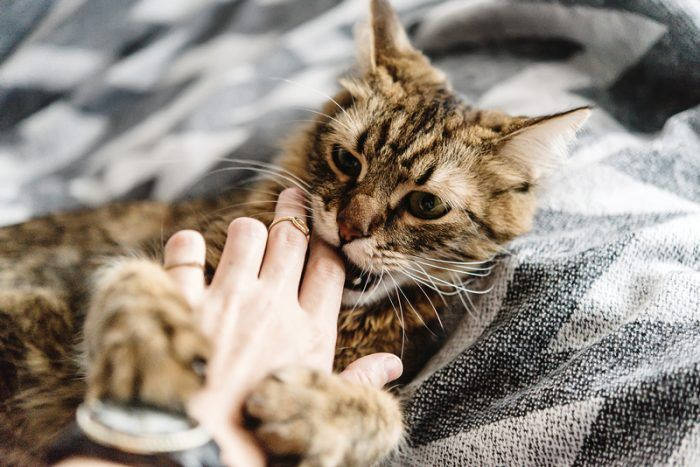
Licking the owner's hand is a bite
Often people who keep a cat at home are surprised by this pattern: just now the pet was purring and licking its fingers and suddenly it bit. There can be several reasons for such behavior. For example, an unrealized maternal instinct. Cats may bite when licking their offspring. Or it may be a sudden change in the pet's mood. In this way, the pet wants to say that he is tired of petting and needs to be left alone. To prevent such incidents, it is important to pay attention to the cat's body language and notice changes in his mood. So the twitching of the tail and skin on the back, soaring hair indicate a quick attack on the owner's hand.
Resentment .
For the most part, cats are not vindictive and do not hold a grudge for a long time. But when the owner does not allow them to play with some object or does not allow them into some room, they may become angry and show their displeasure by biting. With this behavior, you should try to divert the cat's attention to another thing, try to distract it with play.
Why the cat bites
You have a kitten at home, and he wants to pet. But instead of reciprocal affection, it bites and scratches. Such behavior cannot be ignored, or wait until he himself stops doing so. Moreover, a cat bite may provoke skin infections in the owner. Let's understand the root causes of such behavior.
Cats are predators by nature and they express most of their emotions by biting and scratching. Encouraging such behavior in pets is not recommended – it may be perceived as the norm. We have prepared a list of the main causes of such behavior.
Problems with socialization
May be observed in animals picked up on the street. By hissing and scratching, they protect themselves from the danger that unfamiliar people or the environment may carry.
Disease
Negative reaction to touching sore spots: belly, paw, ear, tail area. If the cat has become lethargic, its appetite has decreased, it bites its hands when you try to pet it, you should consult a veterinarian.
Infectious diseases may also be the cause. During such periods the cat feels weak, it does not want anyone to touch it. Contact the veterinarian immediately at the slightest suspicion of an irregularity in the pet's health. And if you already have an appointment sheet, patiently administer treatment.
Playing
Play is first and foremost hunting and then entertainment. Pets do not need to hunt to get food, but instinct occasionally causes them to set their teeth and claws in motion. It is necessary to prevent such games, although much depends on the age of the pet. If the kitten is still very young, it just does not have enough games and involves the owner. and yet such a habit should always be suppressed, because in the future it may provoke the appearance of more serious problems. You should educate your baby from the day he came into the house.
Manifestation of love
A frequent situation – the cat is petted and then bites . This can be explained by the fact that they are very fond of attention. If the owner does not respond to the flirting, this can cause resentment, which will be expressed in this unusual way.
How to Teach a Cat to Bite
Carefully observe the kitten and try to find the reason for his behavior. And depending on the reason choose your tactics.
If the animal is stressed, you need to eliminate the cause of irritation. Or perhaps it is enough to wait a little, so that he gets used to this irritant.
The first enemy of decent cat behavior at home. Toys, play complexes, and children can be involved in playing with the kitten will help to fight it. In general, while the kitten is awake, it should be engaged in active games.
If the object of the hunting instinct were fish in an aquarium or a bird in a cage (that is, the inhabitants of the apartment), it will be wise to isolate them from the kitten for some time. For example, just don't let him into the room with them.
If the kitten's attention is attracted to objects in the street, it is worth temporarily removing them from view. For example, close the curtains or lower the blinds.
This is the most common reason, and correcting scratching at play is probably the most difficult task. You can't punish the pet – the kitten just won't understand why. You have to show him that this kind of play does not suit you – just stop it and get away from the kitten. He will remember this for a long time.
Attention: Never try to snatch an arm or leg in case of an attack. This is behavior typical of prey, and the cat will happily continue "stalking".
Reasons why cats may bite when you pet them
To understand the causes and take the necessary measures, you just need to observe your pet – so you can answer the question of why a cat bites when you pet it. There are the most common reasons for such cat behavior:
- The cat bites, remembering past experiences. There are those owners who pet the baby before injections, baths and other unpleasant procedures. Remembering the consequences to which the tenderness led last time, the pet becomes nervous and behaves aggressively.
- It is established that your teddy by nature can not fully trust human hands, but its need for care and thirst for affection blunts its instincts. The animal resigns itself to being stroked by you, perceiving your hand as its mother's tongue. But after receiving a certain amount of tenderness, instincts override desire: that's why the cat bites when you pet him.
- Deterioration of health is one of the common problems. If petting brings pain and discomfort, aggression will be inevitable. For example, your pet may have a tummy ache that you are so actively petting, or there may be skin problems, itching, irritations. The main thing here is to notice such signs in order to visit the doctors in time.
- Aggression in a pregnant cat is another defensive reaction. If before the baby was affectionate and kind, then in the interesting position her character changes dramatically.
- Why do cats bite when stroked? It may all be a grudge against the owner. If the cat misbehaved and was punished, he may sulk for a long time, although you have already forgotten about the incident.
- Bites may be caused by an unwillingness to receive affection. If your hands give off an unpleasant smell, for example, after stroking the dog, the feeling on your own fur coat will not like your furry friend. Such scents also include perfumes, hand creams, masks with a pronounced scent of herbs.
- Some cats will not even trust their belly and tail to be fondled by their beloved owner: the head and neck are the places you have to settle for if you don't want to be bitten.
- If you are looking for an answer to the question of why a kitten bites when you pet him, it is worth paying attention to his behavior at this moment. He may just be playing and frolicking, not realizing that he is hurting.
- A surge of hormones can be the starting point for aggression, as can clipped claws.
- Why does a cat bite for no reason? When the owner shows too much affection and attention, not every pet is able to appreciate such care, sometimes he wants to be alone. Other animals sink their teeth in, on the contrary, because of boredom, they want attention and tenderness. Perhaps you forgot to clean the litter box or did not pour food into the bowl.
What to do if kittens bite, how to educate them
Once you have determined why cats bite when you pet them, you need to engage in re-education or elimination of the causes of aggression, because you are unlikely to be satisfied with permanent marks from sharp teeth. If the problem is a disease, there is only one thing to do: treat the friend. With a surge of hormones you must also help, either by calming the animal down or by finding a mate for him. Most often the unpleasant behavior is due to the nature of the baby, but you need to educate him from an early age, then it will be difficult to explain what is bad and what is good.
If your cat bites when you pet it, you must immediately say "No!" or try to distract the aggressive pet. Distracting with treats is forbidden – it can turn into a bad tone. The baby must understand that such behavior is unacceptable: shush him or take him off your hands – in time he will understand that biting is the wrong thing to do. The kitten should not be showered with tenderness: understand that it has not yet had time to become attached to you and does not know whether you can trust a person, so at first "dose" tenderness in small portions.
To avoid unpleasant consequences, carefully study the cat's behavior – it's quite easy to understand that something is wrong. When you pet the animal, it is in a relaxed state. But if the tail-tip starts twitching, ears moved back, and pupils dilated, you should stop, otherwise be sure that the marks from the sharp teeth and claws cannot be avoided.
Note! Often at 3-8 months of age the kitten will bite because of teething. The need will be natural, it is important to buy toys for him in time.
How to wean a cat from biting and scratching
So, once you are sure that the cat's aggressive behavior is not due to health conditions, hormonal imbalance or stress, you need to start taking measures to eradicate the bad habit.
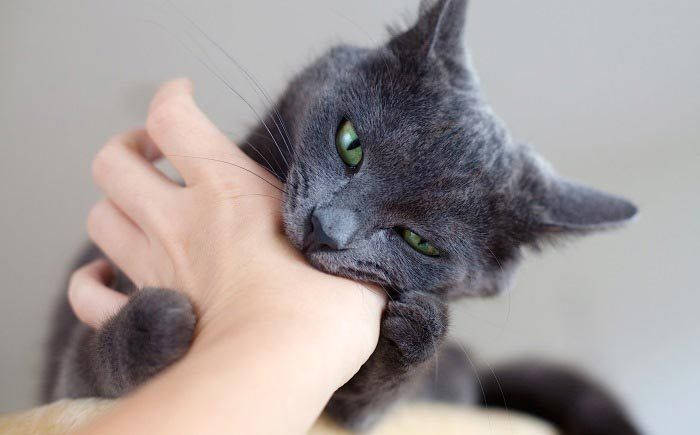
1. From the very first days of a kitten's life in your home educate him. At times of play do not allow the baby to bite its hands and feet. For this it is better to use toys – balloons, rods, teasers, interactive models . For older four-legged animals, appropriate Toys with herbal scents, which have a gentle soothing effect .
2. Remember that scratching the owner's hands and feet may be due to the natural need to sharpen their claws. The following claw brush will help to solve the problem scratching post . You can choose a whole playful complex Including a house for resting and toys.
If the cat starts to scratch, bite your arm or leg, don't tear it off. Freeze and wait for your pet to let go of it. In time she will understand that aggression is a reason on your part to stop playing.
4. Never use physical force! This may be another reason for resentment, fear, or stress – and the situation will only get worse. As a last resort, you can distract the cat with a loud sound, such as clapping your hands.
5. After a sudden attack don't scold the cat, just ignore it for a while, don't play with it, don't respond to its meow. She needs to understand that you are offended. You don't need to doubt your pet's intelligence – she is able to sense that she has done something wrong.
Remember that getting rid of a bad habit is a long and complicated process that may take several weeks or even months. You should have patience and endurance.
How to protect yourself from scratches
The best defense against scratching is timely measures taken to ensure that the cat does not have this habit at all.
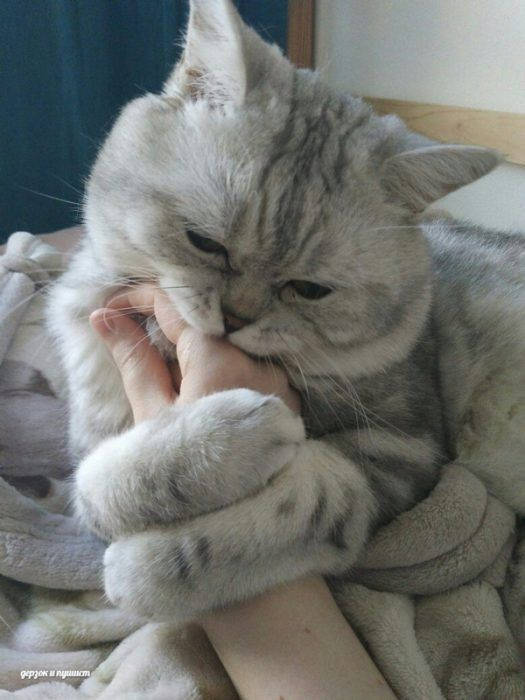
1. Explain to everyone in the family that you can't play with a kitten or adult cat by putting your hands or feet up. It is better to use toys.
2. Do not limit the kitten's communication with new people. Guests, on the other hand, should be explained that babies should not be held for long periods of time, and be careful not to step on them.
3. Dose the time of communication with the cat. Prolonged petting may not please the cat. The same applies to children playing with the pet – they must understand that you should not impose communication on the four-legged man if he is not in the mood for it at the moment.
4. Pay more attention to your pet by playing with it, responding to petting, saying kind words, petting it often and spoiling it with Give your pet lots of petting and treats. .
5. Perhaps your cat is just bored because he can't find a playmate. Consider getting her a four-legged friend.
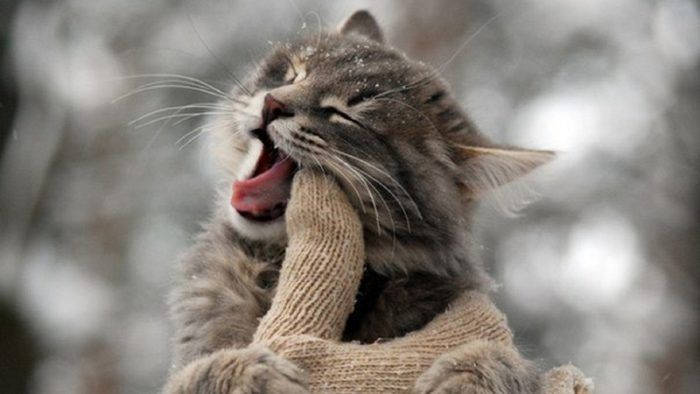
6. Try to avoid stress in your pet. During the holidays, which are celebrated in our country with the use of pyrotechnics, it is best to go to a quiet and peaceful place. If this is not possible, choose the quietest room and close all the windows. Until the explosions are over, be by your pet's side, petting her, soothing her with an affectionate voice. This also applies to home celebrations with many guests. Allocate a separate room for the cat and warn it so that no one goes in there. Arrange a "safety corner" for her – put her favorite Put your cat in a "safety corner" – a pet cat lounge or baskets with water and food. Help your cat to food and water bowls, Tray and toys.
Is scratching always aggression?
It is common for adult cats to scratch mostly because of aggression caused by external factors, health conditions or emotional background.
But there are other situations and reasons why an animal may scratch a person:
- A cat is bored and demands more attention from its owner by touching it with its paw and sometimes letting its claws out.
- Adult cats often exhibit childlike outbursts of playfulness. In such cases, they begin, like kittens, to scurry around the house, jumping, chasing rustling or rattling objects, and playfully hunting for the hands and feet of humans.
- Sometimes an animal will instinctively show sympathy. In nature, cats express their "love" for an object of interest by licking and then lightly nibbling or scratching. If a cat bites its owner softly, alternately licking and lightly clawing, this is most likely how it expresses its love.
Before scolding the cat or using educational measures the owner should find out the reason for such behavior – not always the pet is aggressive. And this means that weaning methods should be milder.
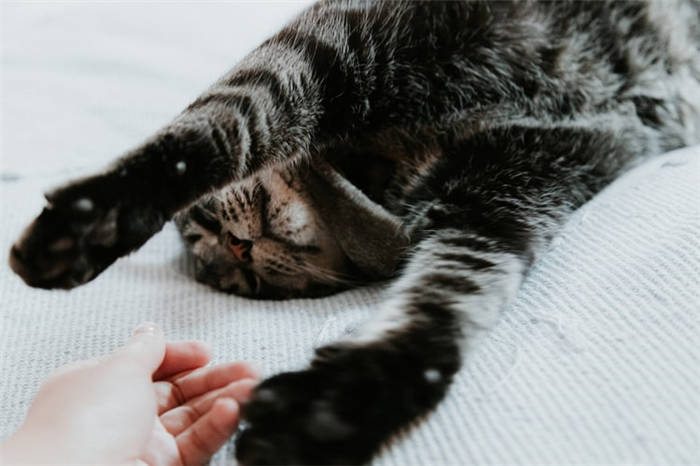
Why adult cats scratch
There are many reasons for an adult cat to scratch, and sometimes there are several reasons for the same behavior. Before you start training, you need to determine the cause of the scratching and, based on this conclusion, choose a method of weaning.
Inability to clean claws
Some adult cats may scratch because of "inept" handling of their claws. There are individuals who do not fully hide their claws when playing. They do this, of course, not on purpose. Especially often it happens with cats, which in childhood played with the hands of man – so they got used to scratching in play.
Sometimes cats climb on the legs and back of the owner, like a tree. This can be due to an overabundance of feelings, fear, or a trivial habit – the pet has learned since childhood to climb on the beloved person and sit on his shoulders.
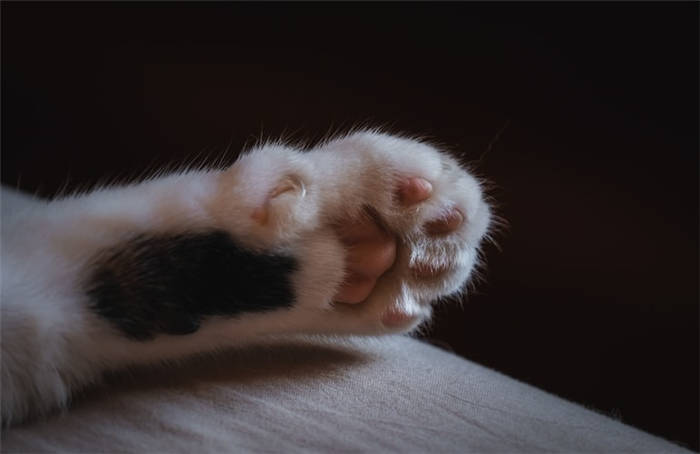
In any case, it happens with the use of claws in order to hold on and not to fall down. These situations have nothing to do with aggression – it's just that the cat hasn't been taught to climb on the person.
Playful fuse
Cat play is often driven by instinct. A domestic cat can hunt for a ball, a toy, its reflection in a mirror, or its owner's legs and arms. In the process of play, the cat forgets and begins to "really" hunt moving, rustling, shiny and rattling objects.
Often the owner's gesticulating hands become the object of the hunt. A frustrated cat will attack and, in its excitement, it can let its claws and teeth fly out. If the animal is well-mannered, a scolding "No" is enough for the cat to loosen its grip and return to the harmless mode of play.
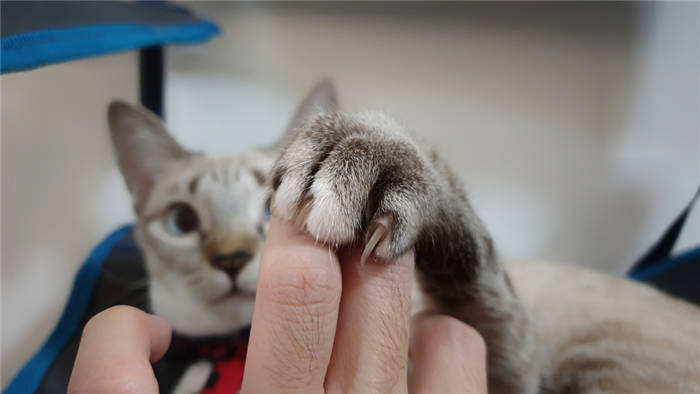
Aggression
Sometimes a cat bites and scratches its owner's arms or legs in a state of aggression. Anger can manifest itself due to ill health, pregnancy – or if the cat was taken from the street and is not yet well socialized.
Why a cat is petted first and then may bite
Most often, whiskered pets bite, if not in play, then at the moment of petting. In this case, there is an abrupt change in behavior. An affectionate cat, which just a minute ago showed no signs of aggression and was happy with everything, abruptly gnaws at its owner with a dead grip. There are seven reasons for this strange reaction.
Tired of being petted, wants to stop
The simplest explanation is loss of interest. Your pet may simply be fed up with the increased attention, which he will immediately inform you with his teeth and clawed paws.
It is quite easy to detect discontent in advance. For this purpose you should carefully watch the non-verbal signals. If the cat looks tense, presses its ears and wags its tail, it should be left alone.
Excessive emotion needs to be defused by tipping the scales in the opposite direction. The closest equivalent to an aggressive "bite" while petting is laughing through tears.
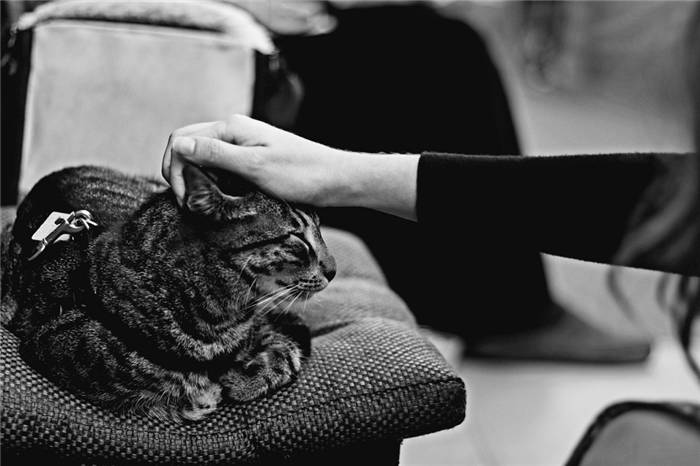
Doesn't want human contact
All animals are very different. Some like to be scratched behind the ear, some like to have their tummy stroked, and some like neither. In the latter case, the pets are more than happy to sit on their knees, "knead dough" and rub their muzzle against the owner's hands, but immediately turn into furious furies if they are touched.
A similar situation occurs if the cat just came to warm up. Its aggression can be explained by unreasonable expectations, because in the first place it came to the place where it is warm, not to a human.
Petting in an unpleasant place
Most cats like to be stroked on the head, chest and back, as well as at the base of the tail and neck. They feel quite differently in the belly and paw areas. Only a handful are allowed to touch these areas, so don't be surprised if your pet is no exception.
How to react to biting while stroking
The owner's reaction determines the pet's further behavior. If you are bitten, use the following guidelines:
- Flick the cat on the nose. This action will help distract it from your hands. The most important thing is to correctly calculate the force to be applied. The click should be unpleasant, but not painful.
- Make a harsh sound. A whistle or clap will also help to divert attention and stop the furry aggressor.
- Squirt out a squirt of water from a spray gun. Your soaked pet will lick his coat and leave you alone.
- Silently walk out of the room. Your walking away will show that an incorrect reaction may lead to loss of attention. This method is only effective if the pet is not tired of being petted. It is also not good if he is in pain, stressed or frightened.
Under no circumstances should he be allowed to respond with aggression. A loud, aggressive behavior will either make the cat more nervous or make him very afraid. In both cases the unwanted behavior will only increase, and with it you will distrust the person.
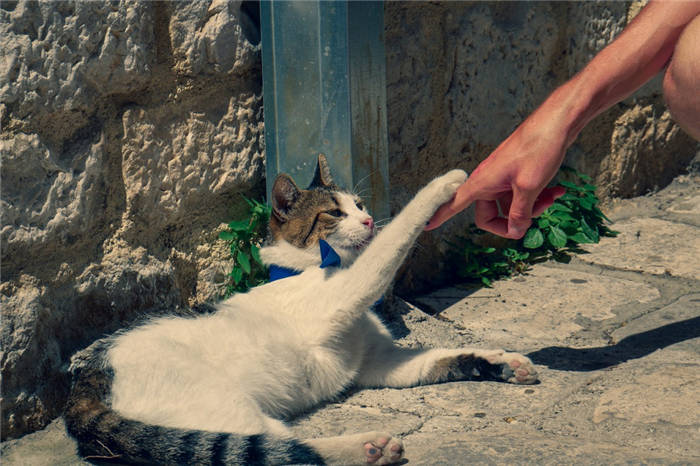
Be attentive to body language. Be sure to stop petting when the following signs occur:
Try to avoid intrusiveness and coercion. Don't pet the cat if he gets nervous and tries to get away from you. Remember a sense of tact and the right to privacy. Your pet deserves them just as much as you do.
How to keep your cat from biting
To understand how to effectively and quickly wean a cat from biting and scratching, it is important for the owner to find the cause of the aggression and eliminate it. After that, you can begin to educate and correct the behavior.
Kitten
To wean a kitten to bite and scratch is not difficult, since his aggression in most cases – playful, the baby has no malicious intent.
In the case of a kitten, the rules are simple: either play with it until the kitten gets tired and stops playing or redirect your attention to another object. The ideal option would be to buy more toys or make them yourself. In case of attack and biting switch the animal's attention to the toy – and he will stop associating human hands with imaginary prey.
It is best to do this while playing – without scolding or punishment. Otherwise play aggression will turn into real aggression – a willful cat will hold a grudge and start to bite out of spite.
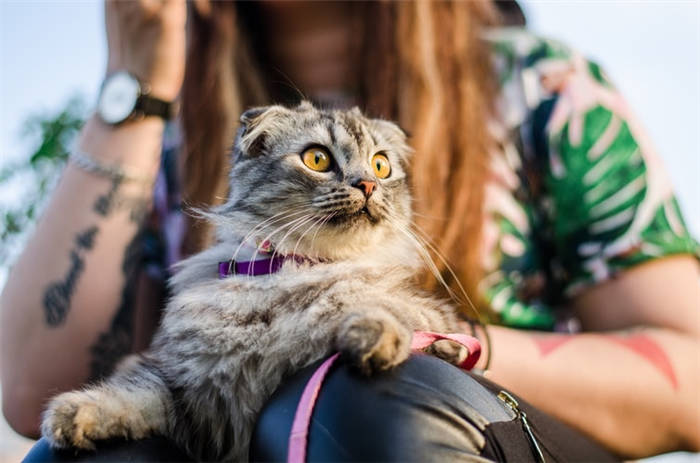
An adult.
First of all, it is necessary to establish the reason why the cat began to attack. If the cat bites for no apparent reason, you need to do something to help him. Because aggression is only a consequence of the problem that bothers the animal.
The main thing is to be firm and consistent in education, not to raise your voice and in no case use physical force. There are a few actions that need to be followed:
A comfortable atmosphere in the home will help the pet be calmer, relaxed and not constantly "on edge." Shouting, noisy appliances or loud music make cats anxious and want to defend themselves all the time.

In case of uncontrollable aggression, when after a sharp "no" and termination of play the cat continues to attack, hiss and lunge, you can try to spray him with water from a sprayer. But this method is undesirable for small and old cats.
Important rules
There are a number of important rules that must be observed when educating a cat:
- Punishment must follow immediately after the misdemeanor, otherwise the cat will not form the necessary association. Even if it is only two minutes between bite and punishment the cat will not make the connection, and it will feel that you are insulting him.
- The punishment should follow the misbehavior every time, not occasionally. This is the only way to develop a proper reflex.
- You should not humiliate the animal, such as locking it alone in a separate room or beating it. Beating a cat is not allowed under any circumstances! Only a light slap with a newspaper or a cloth may be allowed as a physical action. It will be perceived by the animal in the same way as noise.
- Raise your pet with love and affection, and be attentive to him. Always try to understand the reasons for its actions. Do not intrude when your pet is tired and wants to rest.
- Provide personal space for your pet so he can release his energy by playing with toys or practicing on a treadmill.
- Don't provoke or tease your pet. This will form a "sudden movement – teeth" bond.
- Make sure you accustom the kitten to the scratching post. It will provide an opportunity to release the excess energy for the pet, and it will keep the furniture and wallpaper intact.
It is necessary to educate the fluffy pet – you should not expect that everything will work out by itself. With a respectful attitude towards the animal you will grow a kind and sweet friend, with whom you will live in harmony, receiving only positive emotions from communication.






